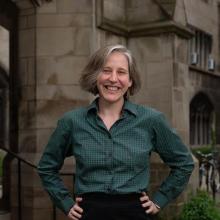2023-24 CISSR Faculty Research Grants Announced
The Center for International Social Science Research has announced its 2023-2024 Faculty Research Fellowship Grants. Providing up to $25,000 for faculty research projects at any stage of development, the awards support field and archival research, purchasing data, research assistance, hosting a short-term visiting collaborator, and/or organizing a conference for publishing a special issue or edited volume.
“Rooted in tried-and-true social science methods, these projects also innovate methodologically: arguing for re-examinations of fieldwork and logistics, carrying out archival research from new perspectives, and analyzing domestic politics to understand the effects of global powers on small nations,” CISSR Director Jenny Trinitapoli says.
“As in previous years, CISSR faculty fellows will be working across the globe, in Bolivia, China, Nepal, the Suez Canal, and Germany. And this cohort of fellows showcases CISSR’s commitment to grappling with timeless questions that have relevance to the world we inhabit today.
The Center chose faculty with individual and collaborative research projects that are international, transnational, and global in nature and address contemporary and historical questions. Projects are theoretically informed and empirically grounded and will benefit from critical dialogue across disciplinary, methodological, and geographic boundaries.
“CISSR is proud to support these projects and the faculty leading them. Most of all, we’re eager to learn, in the coming years, about the findings from these sparkling examples of the international social science research being advanced from within the division,” said Trinitapoli, who is an associate professor in the Department of Sociology.
The selected projects are led by faculty in the Comparative Human Development, Anthropology, History, and Political Science.
Marisa Casillas, Assistant Professor, Department of Comparative Human Development
Project: Implementing a Cross-cultural Field-friendly Infant-directed-speech Preference Study
The study of Tsimane in Bolivia has provided quantitative evidence showing that Tsimane infants receive minimal direct language input from adults, but they show higher amounts of directed speech coming from other children. Casillas’s project asks how early linguistic experiences impact perceptual ability, examining the development of infants’ preference for infant-directed speech over adult-directed speech in Tsimane children.
The results of this project will add to knowledge about the influence of early exposure to different input sources and infants' perceptual preferences. This project aims to create and share a field-friendly, low-cost, and cross-cultural experimental setup that will allow the replication of this experiment.
Julie Chu, Associate Professor, Department of Anthropology
Jennifer Cole, Professor and Chair, Department of Comparative Human Development
Project: Emergent Logistics and Experimental Ethnography
The proposed collaborative project is a multi-year effort to develop new methodologies appropriate to the study of emergent types of logistics that are unfolding at planetary scales. This research builds on “Logistics in the Making of Mobile Worlds,” during which Chu’s team developed an interdisciplinary forum through which to investigate the growing ubiquity of logistics as a new way of organizing and understanding contemporary mobility. The proposed second project focuses more squarely on developing solutions to the problem of methodology — specifically, the systematic ways that scholars, students, and the public engage critically with new forms of mobility.
Chu is interested in mobilities that are difficult to document or situate vis-a-vis traditional research sites. The first project focused on movements of people, data and things, Emergent Logistics and Experimental Ethnography refocuses on mobilities of money and energy. Through collaborative empirical engagements with these two new foci, the team looks to develop robust “methodological toolkits” through which scholarly communities and critical publics can encounter the hidden work of logistics in their lived worlds.
Aaron Jakes, Assistant Professor, Department of History
Project: Tilted Waters: The World the Suez Canal Made
Tilted Waters is the first book-length study of the Suez Canal to be written in English in half a century. The book reframes the history of the waterway as a history of global capitalism by examining the canal’s many and changing roles in the production of global inequalities over the past two centuries.
Jakes’s project draws on extensive archival research across four continents to make a case that goes beyond existing studies focusing on the channel’s status as a manufactured shortcut. The book as currently planned will comprise 14 chapters as well as an introduction and an epilogue. This project will entail extensive research in libraries and archives across at least four continents. The plan is to publish Tilted Waters with a trade press on the model of several other recent histories of global capitalism that have managed to reach broad readerships while also eliciting serious engagement from academic audiences.
Jonathan Lyon, Professor, Department of History
Project: Gendering the Archive? The Power and Authority of the Abbesses of Quedlinburg, 1125–1511
A four-week research trip to Germany to visit three archives would lay preliminary groundwork for Lyon’s research, leading to a series of journal articles and a monograph. The project uses source material for the abbesses of Quedlinburg in Germany to address the question of the gendered dimensions of power and authority. Hundreds of surviving documents from the 12th to the early 15th century show how the abbesses interacted with both the people under their authority and their neighbors, but these sources remain largely untouched by historians.
The goal is to spend more time in these same archives to begin a more systematic analysis of the documents. Multiple methodologies would be employed, including network analysis based on the large numbers of names contained in many of the documents' witness lists; physical analysis of the documents themselves to determine how documentary production at Quedlinburg developed between the 12th and 15th centuries; and analysis of the language of the documents to address the question of whether distinctive, gendered terminology is evident. By using multiple methodologies, the goal is to offer a comprehensive assessment of the nature of the abbesses' power and authority.
Johanna Ransmeier, Associate Professor, Department of History
Project: Legal Literacy and Imagined Law in Republican China
Ransmeier’s proposed book focuses on vernacular conceptions of the law during China’s Republican Period (1911-1949), a time when multiple states competed for the loyalty of ordinary Chinese people. The circulation of popular ideas about the law is traced across a fragmented political landscape. Using material from Taiwan’s rich library and archives, and judicial records from China, the book will describe the legal consciousness of the less-than-literate and the circulation of new vocabularies of adjudication and legal ideas.
Exploring visions for the law, the project seeks to understand citizens’ frustrations and to shed light on the eventual appeal of communism. Legal literacy is more than the sum of the state’s efforts to promote its laws. Rather than focus only on didactic legal education, the book explores acts of imagination, as ordinary people deployed legal language outside the courtroom. The project examines legal records alongside cultural and political artifacts: plays, short stories, handbooks on family discipline, public signage, cadre manuals, extrajudicial contracts, and advice columns. According to Ransmeier, when China’s government subverts rights to the interests of the party, this portrait of the vernacular law in Republican China will remind the world of the forgotten origins of Chinese legal dreams.
Paul Staniland, Professor, Department of Political Science
Project: Great Power Rivalry and Internal Politics in Modern Asia
Staniland’s book project explores when and how major power interstate competition becomes present in the internal politics of third-party states, and why the nature of this presence varies. The book considers a world in which domestic factions and political cleavages are embedded within and connected to external geopolitical rivalries.
Empirically, the project examines post-1945 South and Southeast Asia, mixing interview, historical, and quantitative data to explore when and how the major power rivalries of this period have refracted into the internal politics of smaller — though often still hugely important — states.
A fellowship would fund two primary activities: a trip to India and Nepal during the fall of 2023 to do interviews and gather materials on how major power competition has affected domestic politics, with a primary focus on Nepal. Second, the funding would go toward hiring two research assistants to pursue a set of country cases and quantitative codings.
Mareike Winchell, Assistant Professor, Department of Anthropology
Project: Ghostly Invasions: Political Theologies of Fire in Post-Coup Bolivia
The fellowship would fund the first of a three-year ethnographic study of the politics of fire in postcoup Bolivia. According to Winchell, “wildfires have been weaponized by a populist far-right in the country as exemplary of the duplicity and deceit of Leftist politicians and irrationality of their Indigenous and populist supporters.”
The study is aimed at learning about collaborative responses to climate change that have emerged since Bolivia’s 2019 coup, and which seek to undermine the co-optation of conservationism within a polarized nationalist milieu, in which media coverage and images of uncontrolled fires have been used to harden lines between Indigenous and non-Indigenous peoples. Winchell’s research aims to illuminate the new kinds of environmental organizing that have emerged at a moment of escalating racist critiques of the populist Left in Bolivia. Methodologically, the study combines attention to environmental changes with an attunement to the broader political configurations at play in global climate change and in localized efforts to address a rapidly heating planet.
Resulting publications will support scholarly and policy efforts to address climate change through the tools of interpretive social science, examining religious and theological underpinnings in the culture and revealing how competing ontological frames obstruct and generate possibilities for climate justice.
 THE UNIVERSITY OF CHICAGO
THE UNIVERSITY OF CHICAGO










